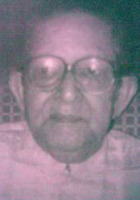Nabakanta Barua
Nabakanta Barua Poems
It is afternoon now.
Let’s go to the tailor’s; to get measured.
Measurements of neck chest hands and arms
Measurements of the palm and the heart
...
We housed them in prisons
For they wanted a home,
We killed them for they wanted eternal life
Then bulldozed their prisons into fields of corn
...
The corded belt of my mother’s spinning wheel
was a mystery to me
spool after spool is used up
the distended bobbins pile up in the basket
...
The fire of the palaash has gone out now.
In the saal and sotiyaan woods
Spring-storms of days past —
Days of the Burmese invasion.
...
God gave man intellect.
He could go insane with it.
His heart full of blood
could not be trustful.
...
The fossil heaved its stony sigh
Moaning:
God’s failures have caused,
All his tears to helpless man.
...
Last night
Someone poured ink into Umiam
How the streetlights emitted darkness!
...
Once we went aboating
On the Ganges…………
The pale winter moon rose above the old cemetery
We remember we talked
...
God gave man brains
To achieve lunacy therewith.
With his body plenished with blood
The heart took on the task of mistrust.
...
Offerings to the mother have been washed
with brother’s bolld;
To satisfy the mother earth
Offering’s flesh has been cooked in her breast’s milk!
...
Within this dark shell
All emptiness is substantial
The sky and the earth reach me
In all elastic opacity.
...
Once
At the bank of river Tamasa
Someone killed a karchana separating it from its mate
Exploiting nature
...
Nabakanta Barua Biography
Navakanta Barua (Assamese: নৱকান্ত বৰুৱা)also known as Ekhud Kokaideu, was a prominent Assamese novelist and poet. Early Life and Education Nabakanta Barua was born December 29, 1926 in Guwahati to Nilakanta Barua, a school inspector and later teacher, and Swarnalata Baruani. He had three brothers: Devakanta, Jivakanta, and Sivakanta. (Devakanta Barua also became a well-known Assamese poet, best known for poem collection Sagor dekhisa.) At first the family lived in upper Assam, then moved to Puranigudam and lastly lived in Nagaon town. He started his education at a nearby school, then joined govt Mojolia school. In 1933 he was admitted to Nagaon govt boys in class 3, from there he completed his matriculation in 1941. After that he got admitted to Cotton College, but he lost two years due to illness. In 1943, he went to Shantinikaton (West Bengal). In 1947 he completed his B.A. with English honors and in 1953 M. A. from Aligarh Muslim University. Career He worked in Uttar Pradesh at Shikohabad at A.K collage , but the same year he had joined Jorhat's Jagannath Barooah College. In 1954 he joined Cotton College and worked there until 1964. From 1964 to 1967 he worked at Assam Madhyamik Shiksha Parisod as an officer of English education . He again joined Cotton College, retiring as a vice principal in 1984. He served as president of Asam Sahitya Sabha's Dhing Adhibashan in 1968 and presided over Asom Sahitya Sabha's Bishwanath Chariali convention in 1990. Published Works Barua wrote most criticized and recited poems like "Polokh", "Monot porne Arundhati", "Norokot DonJuan", and "Crussot DonJuan". Barua's contribution to Assamese art and literature includes 39 books in all: 11 poem collections, 5 novels, essays, short stories for children (Xeali palegoi ratanpur) and lyrics. Some of his works have been translated to different Indian languages. In 1984, he published the Assamese magazine Sirolu, later republished as Natun Sirolu. Awards 1974: Assam Prakashan Parisod Award, Mur aru Prithibir 1975: Sahitya Akademi Award to Assamese Writers, Kokadeutar Har 1976: Padma Bhushan, Literature & Education 1993: Assam Valley Literary Award)
The Best Poem Of Nabakanta Barua
Measurements
It is afternoon now.
Let’s go to the tailor’s; to get measured.
Measurements of neck chest hands and arms
Measurements of the palm and the heart
We shall give measurements of the entrails
And the kidney and the liver,
Give measurements of hormones and affections
Let us give measurements of life,
Of this that and several things.
Give only the measurements.
We shall think of the stitching later on.
For the time being let’s just give the measurements
We can only give measurements.
We can only take reckonings
We shall record that suicides have
Swelled considerably.
We shall give count of the number
Of letters in a speech.
Give count of the Christians in Arabia.
Just give measurements.
We shall think of the stitching later on.
Merely think.
Someone after us will measure anew
Saying that our measurements have gone awry.
Fresh new measurements they’ll take.
Just take measurements.
When will someone stitch the garment to fit man?
[ Translated by Pradip Acharya ]
Nabakanta Barua Comments
Hearty salute to the Assamese poet on the day of his birth. His contribution to Assamese poetic literature will be remembered with due respect forever.

hertly salute.6/2/2021